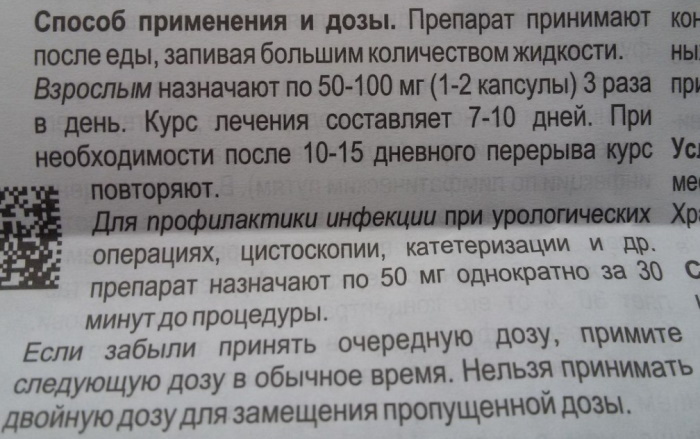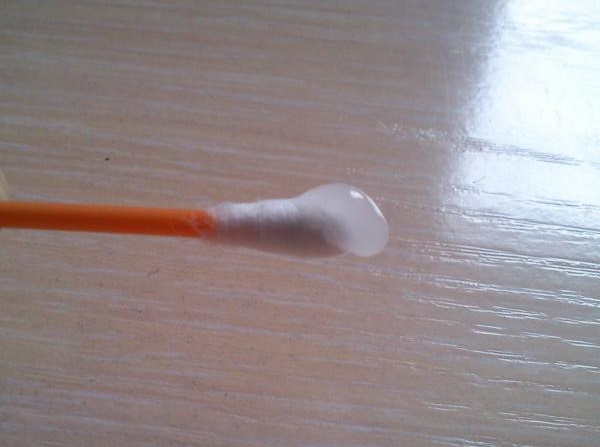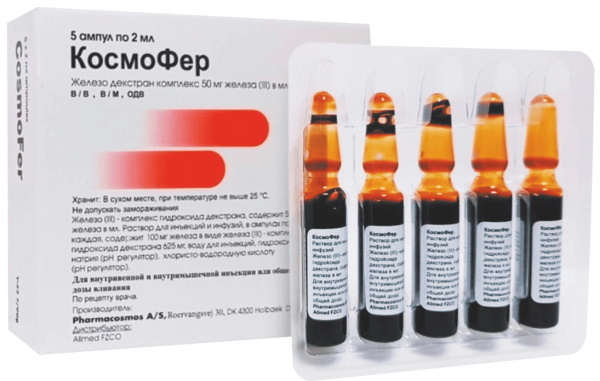Content
- Views
- Symptoms and Signs
- Causes
- Diagnostics
- Treatment methods
- Drug therapy
- Folk remedies
- Diet
- Potential consequences and complications
- Video about duodenitis
Duodenitis is a disease an inflammatory nature that affects the mucous membrane of the duodenum. The first symptoms of pathology are severe pain and stool disturbance, which leads to the appearance of nausea and diarrhea. The diagnosis and treatment of adult patients is carried out by a gastroenterologist. The specialist selects the most effective drugs and makes up a special diet to prevent possible consequences.
Views
Duodenitis in medicine is classified, taking into account certain features:
| Name | Views |
| The area of localization of the inflammatory focus |
|
| Origin of inflammation |
|
| The degree of structural changes present on the mucosal surface |
|
| Endoscopic picture |
|
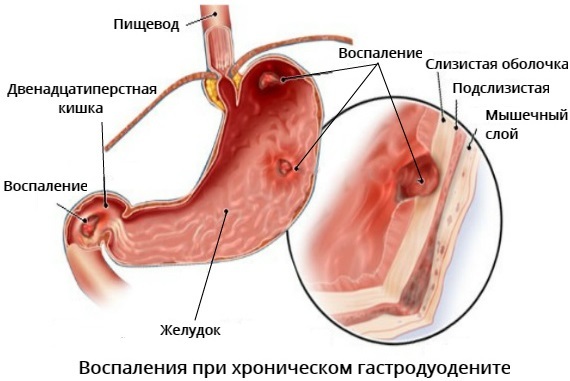
In some situations, duodenitis proceeds without pronounced symptoms. The asymptomatic form of the disease is more common in older people. Pathology is detected during a medical examination.
Given the course of the inflammatory process on the surface of the mucous membrane of the duodenum, the following forms of the disease are distinguished:
| Name | Description |
| Acute duodenitis | A pronounced inflammatory process is provoked by toxins, infections, chemicals, and also spirits. The rapidly progressing disease is accompanied by intense pain in the epigastric region, nausea, sometimes vomiting, and profuse salivation. |
| Chronic | A prolonged inflammatory process occurs in most cases simultaneously with gastritis. It is characterized by periodically manifested exacerbations against the background of provoking factors and remissions. |
In each individual case, a certain form of duodenitis is accompanied by characteristic clinical symptoms, with which it is important to immediately go to the hospital to see a gastroenterologist. Timely diagnosis and correctly selected therapy will help stop the progression of the inflammatory process and prevent complications.
Symptoms and Signs
Duodenitis (symptoms and treatment in adults, the gastroenterologist will help determine the drugs) is more often diagnosed in men due to the fact that representatives of the stronger sex abuse alcohol and lead an unhealthy image life.
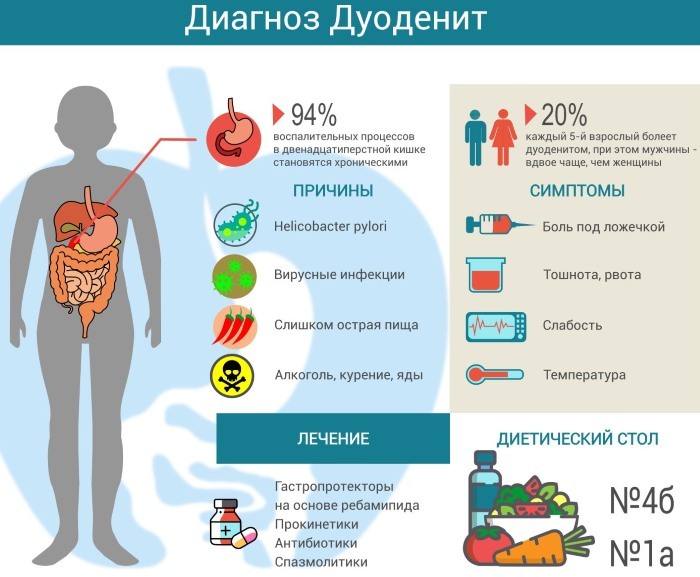
Given the course of the inflammatory process, the patient shows characteristic clinical symptoms:
| Name | Symptoms |
| Acute duodenitis |
|
| Chronic |
|
Each patient has individual clinical signs of duodenitis, since everything depends on certain characteristics of the organism. In some situations, there is also an increased body temperature, general weakness and malaise.
Causes
Duodenitis (symptoms and treatment in adults, drugs will be determined by a specialized specialist) provoke numerous external and internal factors, against which the pathological processes of acute or chronic character.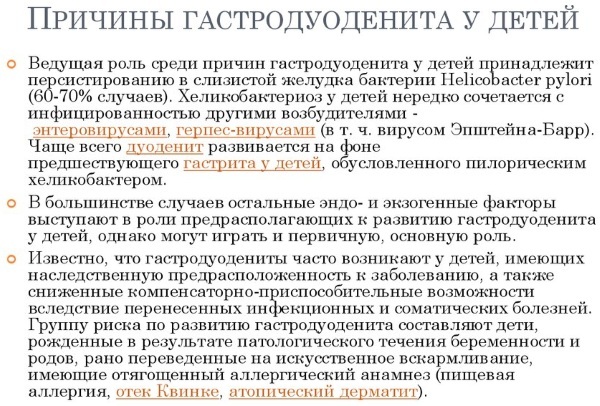
| Name | Causes |
| Acute duodenitis |
|
| Chronic |
|
In any situation, pathological processes are accompanied by pronounced symptoms that will help the doctor a gastroenterologist to establish a preliminary diagnosis and prescribe the patient the most informative examination.
There are also predisposing factors that contribute to the appearance of an inflammatory focus:
- irregular eating, eating foods that are unhealthy;
- bad habits (abuse of alcoholic beverages, tobacco products, drugs);
- food allergic reaction;
- prolonged stress, nervous strain at work or at home;
- improper or prolonged use of certain medications;
- chronic constipation;
- problems with the functioning of the endocrine system, hormonal imbalance;
- parasitic damage to the human body.
Pathological processes do not appear immediately. Prolonged exposure to negative factors leads to the fact that blood circulation in the organs of the digestive system is impaired. Local immunity gradually decreases and an inflammatory process develops. Therefore, it is important to immediately consult a gastroenterologist with the first violations and undergo a thorough medical examination to make an accurate diagnosis.
Diagnostics
Duodenitis (symptoms and treatment in adults, drugs and other methods of therapy are chosen by a gastroenterologist) requires complex examination, since many diseases of the digestive system are accompanied by similar clinical signs. The results obtained will help not only to make an accurate diagnosis, but also to choose the most effective treatment.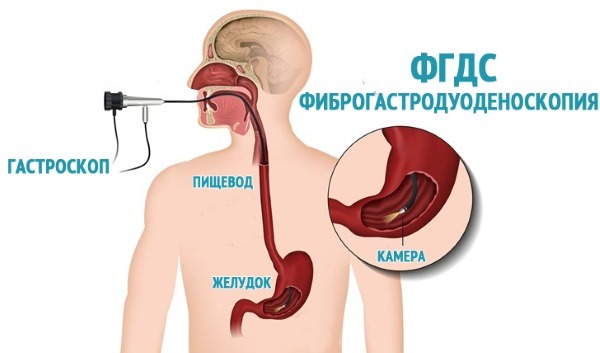
Duodenitis allows you to diagnose the following research methods:
| Name | Description |
| Fibrogastroduodenoscopy (FGDS) | The specialist examines the inner surface of the esophagus, stomach and duodenum. During the examination, a special probe is used, which is equipped with a camera. |
| Biopsy | During fibrogastroduodenoscopy, a gastroenterologist takes a sample of the affected mucosal tissue shells in order to carefully study the material in the laboratory and determine the nature of pathological processes. |
| X-ray contrast study | Radiography with a contrast agent allows you to see the organs of the digestive system in detail and determine the inflammatory focus. Assess the size of the inflammation and the area of the lesion. |
| General analysis of feces | The study reveals hidden bleeding, which is often accompanied by peptic ulcer disease and erosion. |
| General blood analysis | The inflammatory process is accompanied by changes in blood parameters, so anemia is found in the patient. The erythrocyte sedimentation rate (ESR) also increases. |
| Ultrasound examination (ultrasound) | The nearby organs with the digestive system are examined, with the defeat of which the risk of developing duodenitis increases. |
It is important to differentiate the disease, since the effectiveness of the therapy depends on the correct diagnosis.
Treatment methods
Duodenitis treatment is carried out comprehensively after carrying out diagnostic measures, based on the information received. The gastroenterologist draws up a therapy regimen in each case directly for the patient, taking into account the results of the examination and the individual characteristics of the organism. The main goal of treatment is to eliminate inflammation, restore the functioning of the duodenum and the digestive process, and prevent complications.
Drug therapy
Duodenitis in adults is treated on an outpatient basis in most cases, hospitalization is required for the patient if there is an exacerbation of the pathology, there is also a likelihood of developing a malignant tumor or a threat bleeding. The gastroenterologist selects the safest and most effective medications, taking into account the present symptoms of inflammation. It is important to adhere strictly to the indicated dosage to reduce the risk of side effects or complications.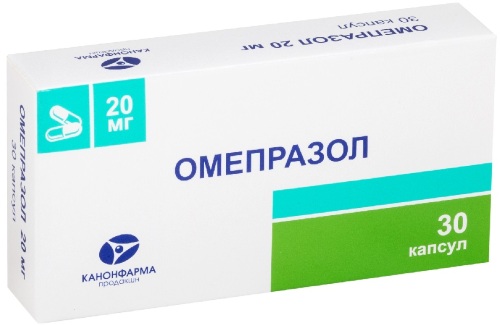
| Drug group | Name | Application |
| Antibiotics | Tetracycline, Metronidazole | Medicines are prescribed to patients if the bacterium Helicobacter Pylori has become the cause of the inflammatory process. The drug is taken orally at 25 mg every 6 hours. |
| Proton pump inhibitors | Omeprazole, Pantoprazole | Medicines reduce gastric acid production and block the functioning of the glands that produce hydrochloric acid. Due to this, the negative impact on the mucous membrane of the duodenum is reduced. The daily dosage of the drug depends on the patient's condition and is 20-40 mg. Treatment lasts 2-4 weeks. The capsules are preferably taken in the morning on an empty stomach. Swallow whole with a little water. |
| H2-histamine blockers | Ranitidine, Famotidine | Prescribed for ulcerative duodenitis, to reduce the production of hydrochloric acid and its irritating effect on the mucous epithelium. An adult is prescribed 15 mg 2 times a day, morning and evening. The duration of therapy is 4-8 weeks. |
| Antacids | Maalox, Almagel | Medicines not only neutralize hydrochloric acid, but also envelop, soothe inflamed tissues, reducing painful sensations. The drug is taken after meals after 1.5 hours or when severe pain occurs. The adult dosage is 1-2 tablets. The medicine is chewed or kept in the mouth until it is completely dissolved. |
| Prokinetics | Motilium, Cerucal | The drugs improve the peristalsis of the gastrointestinal tract, have an antiemetic effect and reduce the swelling of the inflamed mucous membrane. The tablet is kept in the mouth until it is completely dissolved, swallowed without drinking water. An adult is prescribed 10-20 mg 3-4 times a day. The medicine is taken 15 minutes before meals. |
| Enzymes | Creon, Mezim | Medicines contain pancreatic enzymes. They are used to improve the digestive process and the absorption of nutrients. The dosage of the drug depends on the patient's condition and is 10,000-25,000 units during meals. |
| Antispasmodics | Papaverine, No-Shpa | Medicines reduce spasms and pain by relaxing the smooth muscles of the intestinal wall. The drug is taken orally 3-5 times a day. The adult dosage is 40-60 mg. In emergency situations, the medicine is administered intravenously or intramuscularly. |
| Probiotics | Linex, Bifiform | Medicines are used in conjunction with antibiotics to preserve the beneficial intestinal microflora and support the normal functioning of the digestive system. Capsules are taken orally 3 times a day, 2 pcs. |
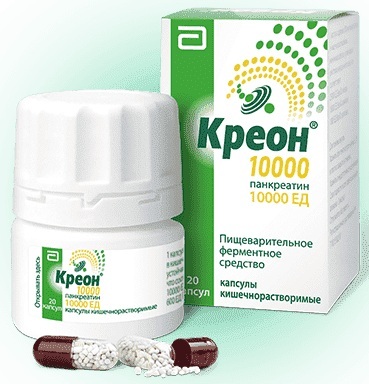
In most cases, duodenitis occurs and is accompanied by other diseases of the gastrointestinal tract, which should also be treated. In the absence of a positive result after drug therapy or in the event of complications, surgery is indicated for patients.
Folk remedies
Duodenitis (symptoms and treatment in adults, the specialist determines the drugs after the diagnosis) allows the use of unconventional recipes of healers and healers, but in complex therapy and after consultation with a doctor gastroenterologist. It is important to remember about the high risk of developing an allergic reaction or individual sensitivity.
The following folk remedies will help reduce the development of the inflammatory process:
| Name | Recipe | Application |
| St. John's wort | Grind dry grass and pour 2 tbsp. hot water (250 ml). Put the resulting mixture in a water bath, heat for 30 minutes. Cool and drain. | A ready-made decoction based on St. John's wort is taken orally. The adult dosage is 1/3 tbsp. 3 times a day, preferably 30 minutes before meals. |
| Nettles and oats | Pour unpeeled oats (200 g) with water (1 l). Put the resulting mass on medium heat and cook until a slimy gruel is obtained. Cool and drain. Pour boiling water over the nettle leaves (3 tbsp.), Insist and strain. Mix the resulting decoctions well and take according to the scheme. | The finished product should be drunk 100 ml 3 times a day, preferably before meals. Nettle tea can also be consumed in place of tea throughout the day. |
| Herbal collection | Mix in equal proportions sage, peppermint, lavender flowers. Grind all herbs well and pour boiling water over them. Cool and drain. | It is recommended to drink the ready-made broth in small portions during the day before each meal. |
| Propolis | Pour 150 g of propolis with pure alcohol (100 ml). Keep the resulting solution in a dark place for 10 days, shake occasionally. | Ready-made propolis tincture must be taken 3 times a day, 15-20 drops, pre-diluted with a small amount of milk. |
| Aloe | Wash and chop the leaves of the plant well. Squeeze out the juice and mix it with the oatmeal broth. Mix all components well until a homogeneous consistency is obtained. | The finished product should be taken 3-4 times a day, 0.5 tbsp. |
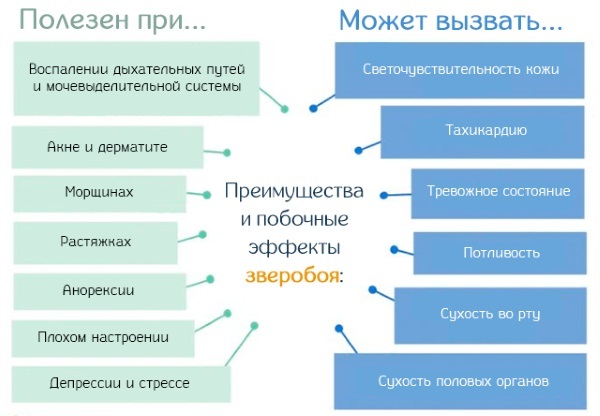
Sea buckthorn oil has a healing effect. It is recommended to take it every morning on an empty stomach for 2 tablespoons. within 2 weeks. Then take a break for 14 days and repeat the treatment.
Diet
Duodenitis (symptoms and treatment in adults, drugs cannot be selected on their own without the help of a doctor, since it is possible to aggravate the state of health) requires complex therapy. Proper nutrition is one of the main directions in the defeat of the gastrointestinal tract. It is important to adhere strictly to your diet to reduce the stress on the inflammatory organs of the digestive system.
| Featured Products | Prohibited foods |
|
|
It is important to observe dietary nutrition strictly with duodenitis, especially the first 3-5 days during treatment. Food should be consumed in fractional portions, often. The expansion of the diet is carried out depending on the flowing form of duodenitis, the effectiveness of treatment and the patient's behavior.
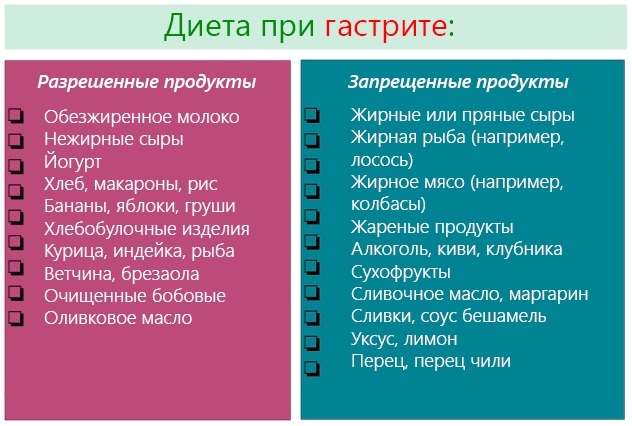
The patient must strictly follow all the recommendations of the attending physician and nutritionist:
- Meals are fractional and frequent, which will prevent the appearance of hunger pains.
- It is better to grind cooked products, pass through a meat grinder to reduce the amount of coarse fibers, they are difficult to digest.
- Dishes should be warm so as not to irritate the inflamed mucous membrane.
- You can add baby food, canned food to the menu.
A properly formulated diet will help not only prevent complications, but also restore the functioning of the digestive system, eliminate inflammation, and speed up the healing process of the mucous membrane. For some time after the therapy of duodenitis, patients should adhere to the compiled diet in order to prevent a secondary relapse of the pathology.
Potential consequences and complications
The progressive inflammatory process of the duodenal mucosa progresses without timely diagnosis and correctly selected therapy. A person runs the risk of experiencing serious complications and consequences in the absence of medical assistance.
| Name | Description |
| Intestinal obstruction | A pathological condition characterized by a partial or complete violation of the passage of food through the intestines. Obstruction is accompanied by severe pain in the upper abdomen. The characteristic and main symptom appears immediately after eating. |
| Duodenal ulcer | Ulcerative foci are formed on the walls of the duodenum, the main reason, in most cases of which is the negative effect of hydrochloric acid and pepsin on the mucous epithelium. The disease is accompanied by severe pain in the upper abdomen. The first signs in a person appear after physical activity or drinking alcohol, heavy food. |
| Malabsorption syndrome | A pathological condition in which the absorption of nutrients through the intestines is disrupted. The main reason is a lack of certain enzymes, as a result of which the functioning of the glands of the digestive tract is disrupted. |
A complication of duodenitis is also intestinal bleeding. A prolonged inflammatory process will lead to the fact that the affected areas of the mucous membrane will be replaced by connective tissue, as a result of which adhesions are formed.
Duodenitis is a serious disease that cannot be started and it is important to treat it correctly. With the first symptoms, an adult should immediately go to the hospital and be examined. A gastroenterologist will prescribe specially selected medications, help you create a diet and give useful recommendations. Self-treatment for duodenitis is unacceptable, since there is a risk of deteriorating health and the appearance of complications.
Video about duodenitis
How are the symptoms and how to treat duodenitis:

